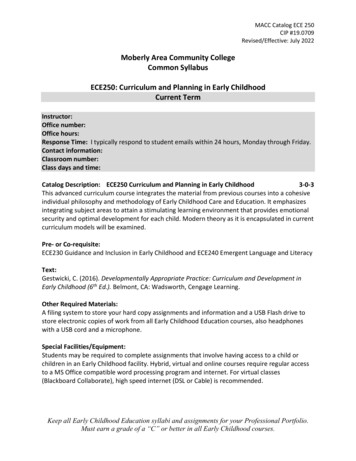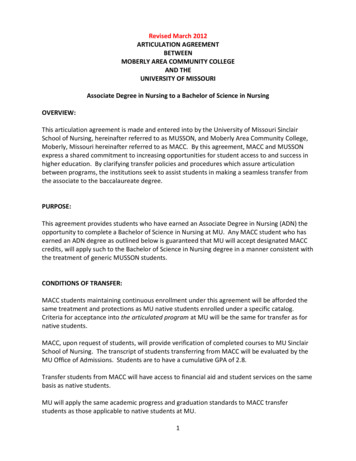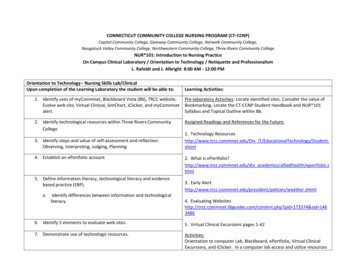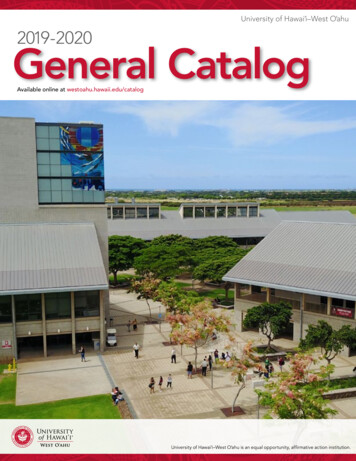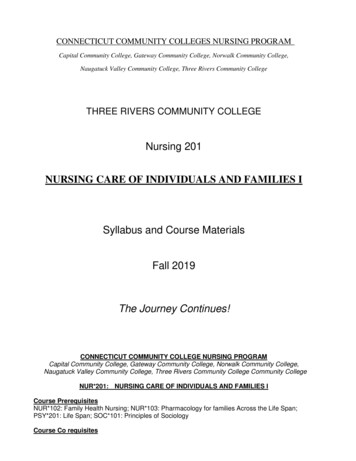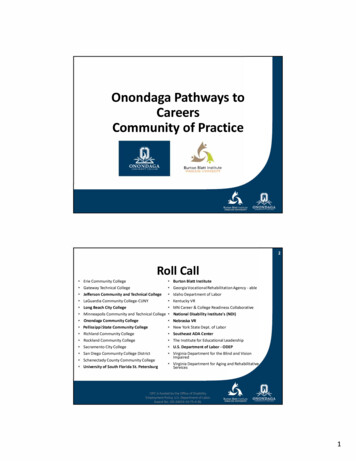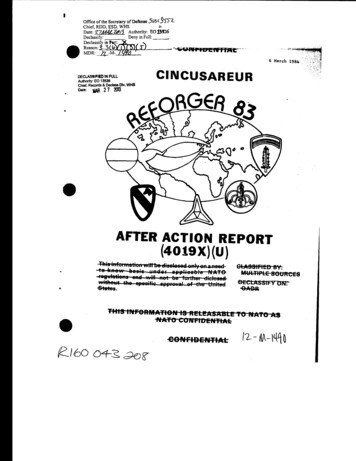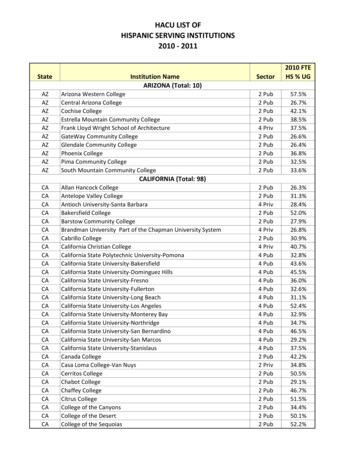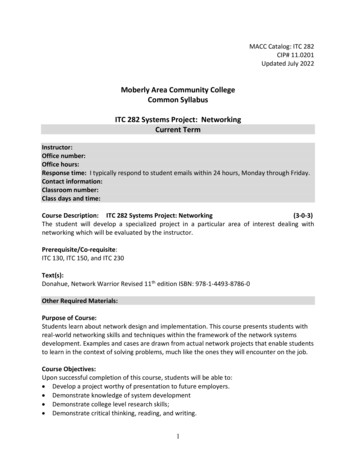
Transcription
MACC Catalog: ITC 282CIP# 11.0201Updated July 2022Moberly Area Community CollegeCommon SyllabusITC 282 Systems Project: NetworkingCurrent TermInstructor:Office number:Office hours:Response time: I typically respond to student emails within 24 hours, Monday through Friday.Contact information:Classroom number:Class days and time:Course Description: ITC 282 Systems Project: Networking(3-0-3)The student will develop a specialized project in a particular area of interest dealing withnetworking which will be evaluated by the instructor.Prerequisite/Co-requisite:ITC 130, ITC 150, and ITC 230Text(s):Donahue, Network Warrior Revised 11th edition ISBN: 978-1-4493-8786-0Other Required Materials:Purpose of Course:Students learn about network design and implementation. This course presents students withreal-world networking skills and techniques within the framework of the network systemsdevelopment. Examples and cases are drawn from actual network projects that enable studentsto learn in the context of solving problems, much like the ones they will encounter on the job.Course Objectives:Upon successful completion of this course, students will be able to: Develop a project worthy of presentation to future employers. Demonstrate knowledge of system development Demonstrate college level research skills; Demonstrate critical thinking, reading, and writing.1
Write college-level English; andCommunicate orally at college-level standards.Course Content:What is a networkHubs and SwitchesAutonegotiationVLANSTrunkingVLAN Trunking ProtocolLink AggregationSpanning TreeRouting and RoutersRouting ProtocolsRedistributionTunnelsFirst Hop RedundancyRoute MapsSwitching AlgorithmsMultilayer SwitchesTelcom NomenclatureT1DS3Frame RelayMPLSAccess ListsAuthenticationFirewall TheoryWirelessVoIPQoSNetwork CongestionNetwork ConvergenceNetwork DesignIP DesignIPv6NTP Connection with Career and Technical Education (CTE) Outcome Statement:In compliance with MACC’s CTE outcomes, the student who successfully completes this coursewill be able to: Students will demonstrate effective written and oral communication skills.2
ASSESSMENT OF STUDENT LEARNINGGrade Scale:A 90-100%B 80-89%C 70-79%D 60-69%F 59% and belowA grade of “C” or higher must be achieved in all required ITC courses (prefix “ITC”) for all ITAAS degrees and certificates.Assessment:(State the way learning outcomes will be measured. They may be measured through, but notlimited to, the following: objective and essay questions, papers, quizzes, oral presentations, classparticipation, small group work, and/or projects.)Expected Study Time Commitments:Students should expect to spend approximately 2 to 4 hours per week studying, reading, andworking on assignments for each registered credit hour. For example, 6 to 12 study hours perweek may be expected for a 3 credit hour class.Description of Assignment(s)/Project(s):INSTRUCTOR POLICIESTardiness:per instructor’s policyMake-up and late work:per instructor’s policyExtra-credit work:per instructor’s policySchedule of Student Assignments/Activities:(Instructors will identify a Student Assignment/Activities schedule. Instructors have theprerogative to construct the schedule by class periods, weeks, or an overview of topics to becovered.)Other:List any other instructor policies3
COLLEGE POLICIES:Attendance:Students are expected to attend all class sessions for which they are enrolled. The Collegereserves the right to drop or withdraw students from courses due to lack of attendance.Students need to be aware that dropping/being dropped from a course and their last date ofattendance in the course may impact their financial aid.MACC faculty are required to track attendance and report lack of attendance. An instructormust complete the appropriate steps to drop a student within one week following the student’sviolation of the attendance policy. Additionally, a student’s attendance rate will be calculatedbased upon the first day the academic session begins (not the student’s date of enrollment in thecourse). If a student does not attend a course as defined below, the student will be dropped as“Never Attended.”Term Length Drop Calculations16-week:Any student who misses two (2) consecutive weeks of class will bedropped from the course by the instructor unless acceptable justification isprovided by the student and the student still has the opportunity to besuccessful in the course.8-week:Any student who misses one (1) consecutive week of class will bedropped from the course by the instructor unless acceptable justificationis provided by the student and the student still has the opportunity to besuccessful in the course.4-week:Any student who misses two (2) consecutive days of class will be droppedfrom the course by the instructor unless acceptable justification isprovided by the student and the student still has the opportunity to besuccessful in the course.Intersession: Any student who misses one (1) day of class will be dropped from thecourse by the instructor unless acceptable justification is provided by thestudent and the student still has the opportunity to be successful in thecourse.Acceptable justification may include, but is not limited to, family emergencies, illness orinjury, college-approved co-curricular and extra-curricular activities, and religious holidays.Definition of Course AttendanceIn SeatPhysically attending scheduled, face-to-face, class meetingsCourse4
VirtualCourseBeing present, via appropriate platform, for scheduled classmeetings/activitiesHybridCoursePhysically attending scheduled, face-to-face, class meetings and activeparticipation in the online portion of the course which may include any or allof the following: Completion of quizzes or exams during class meetings and online Submission of assignments during class meetings and online Participation in discussions during class meetings and onlineOnlineCourseActive participation in an online course includes the following: Completion of quizzes or exams Submission of assignments Participation in threaded discussionsSimply logging into the Learning Management System (Canvas) and/or accessing the course andcourse related material does not constitute active participation for the online component ofhybrid courses or for online courses. (Policy Handbook, G.040)Academic Dishonesty:MACC board policy is as follows: “Academic dishonesty by students damages institutionalcredibility and unfairly jeopardizes honest students; therefore, it will not be tolerated in anyform.” Forms of academic dishonesty include but are not limited to the following: violations ofcopyright law, plagiarism, fabrication, cheating, collusion, and other academic misconduct.Incidents of dishonesty regarding assignments, examinations, classroom/laboratory activities,and/or the submission of misleading or false information to the College will be treatedseriously. The procedure for handling academic dishonesty is outlined in the Student Handbook(Policy Handbook G.020). In cases of alleged academic dishonesty, the burden of proof is on thestudent, not on the instructor.Recording Class Sessions Using Zoom:The privacy of students is a priority in live or virtual meetings. Recordings of lectures or classmeetings that share student information constitute an educational record and are protectedunder FERPA. Instructors may share recordings within the course section where they wereoriginally recorded and only with the students enrolled in the section. Documented consentfrom each student identified in the recording is required to distribute outside of the coursewhere it was originally recorded, or student identity must be redacted.Student Email:MACC Mail is the official student email system at MACC. Official college communication is sentvia this email system. Students are responsible for checking their MACC Mail account regularly.Students may also receive notifications and reminders from MACC through the online learning5
platform. However, students should remain aware that the online learning platform messagingsystem and MACC Mail (student email) system are two separate systems.ADA Statement:Students who have disabilities that qualify under the Americans with Disabilities Act mayregister for assistance through the Office of Access and ADA Services. Students are invited tocontact the Access Office to confidentially discuss disability information, academicaccommodations, appropriate documentation and procedures. For more information, pleasecall either the Moberly office at (660) 263-4100 Ext. 11240 or the Columbia office at (573) 2341067 Ext. 12120, or visit our web page at e.Title IX Statement:MACC maintains a strict policy prohibiting sexual misconduct in any form, including sexualharassment, sexual discrimination, and sexual violence. All MACC employees, including facultymembers, are considered mandated reporters of sexual misconduct and as such are expectedto contact the Title IX Coordinator when they become aware, in conversation or in writing, ofan incident of sexual misconduct. For more information on this policy or to learn about supportresources, please see http://www.macc.edu/sexual-misconduct-policy or contact Ms. CherylLybarger, MACC's Title IX Coordinator, at 660-263-4110, ext. 11369 orCherylLybarger@macc.edu.6
ITC 130, ITC 150, and ITC 230 . Text(s): Donahue, Network Warrior Revised 11th edition ISBN: 978-1-4493-8786- . Other Required Materials: Purpose of Course: Students learn about network design and implementation. This course presents students with real-world networking skills and techniques within the framework of the network systems development.
